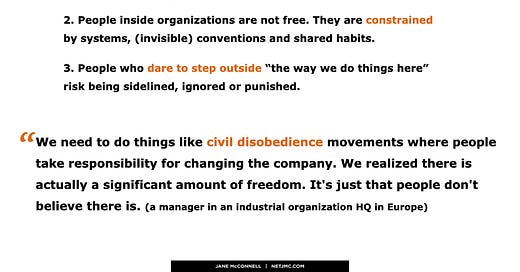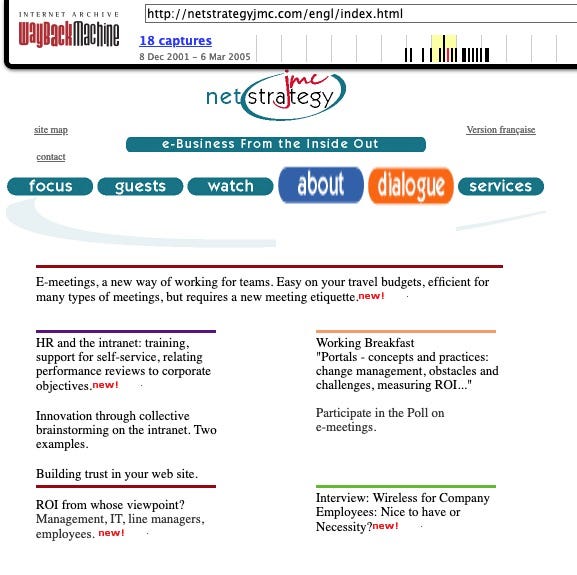October thoughts: Inheritance, manifesto, orchestrating space, and making the world a better place
We all need to remember the importance of living in the present while keeping the future in sight. Above all, we need to recognize what people have achieved in the past.
Welcome to my October Briefing Note.
I’ve worked in the world of organizations for nearly 25 years, and have recently been thinking about future organizational leaders.
What kind of corporate world will young people inherit?
In September, I gave the commencement speech to the Executive MBA class at the Berlin School of Creative Leadership.
It was inspiring to listen to the conversations and especially the talks by the valedictorians. The graduates, already in the workforce, will certainly be leaders in organizations very different from the ones most of us know today.
What inheritance are we leaving for them? Here is a quick illustration of three "shapes" of organizations in what I call “the future is now” that I shared on Linkedin. All three are already here but not yet well-known: the Shamrock organization (Charles Handy), micro-enterprises (Haier in particular) and temporary organizations (the Ice Hotels around the world). The Ice Hotels triggered a lot of discussion about the impermanence of organizations.
I’ve started a Gig Mindset Manifesto.
I’m inspired by the Cluetrain Manifesto of over 20 years ago that changed the way people thought about the web. The 4 co-authors – Rick Levine, Christopher Locke, Doc Searls and David Weinberger – made people aware that the internet was a game-changer. It woke people up!
I believe the gig mindset is a game-changer in the world of organizations. I talked about this briefly at the September IOM summit and shared 3 points from my current thinking.
Other points currently in my Manifesto draft:
Most change initiatives for new efficiency models, new business practices, and restructurings result in internal chaos.
Change starts inside people, often those who are on the edges of organizations, customer-facing, and see more of the external world than do their internal-facing colleagues.
Gig mindsetters are border-crossers, connecting people inside and outside the organization and bringing new insights.
The future is at stake: Work cultures have stagnated, and leadership is still old-school.
I will be working on this with people in my community Bold New Breed. Get in touch if you’re interested in being involved.
Orchestrating space to create competitive advantage
From Bold New Breed podcast in September…
Episode 13. Guillaume Alvarez, Senior V.P Europe, Middle-East & Africa of Steelcase, has a deep understanding of what is changing in organizations today thanks to extensive research Steelcase has conducted on a global scale.
He explains how space can be orchestrated to increase people's well-being, strengthen their sense of purpose, and help make organizations more competitive.
Space lets you create a genuine employee experience: the serendipity of encounters that generate ideas and build trust
Orchestrating space can put leadership in the flow
Well-crafted spaces make people feel more productive and believe in what they are doing
Three stories about people who did not fit in but made the world a better place
Gig mindsetters who did not give up and fought on, bringing immeasurable benefits for all of us today
Alan Turing
In September, I watched The Imitation Game about Alan Turing’s work on the Enigma. This is a film you should check out. (IMDB, Wikipedia)
“Sometimes, it is the people who no one imagines anything of...who do the things that no one can imagine.'“
It’s hard for us today to realize the trauma of the world at that time for people who were not “normal” as defined by society. There are both painful and inspiring moments in the film.
Katherine G. Johnson, Dorothy Vaughan and Mary Jackson
I also discovered three African-American female mathematicians who worked at NASA during the Space Race. You may know them, but I came across them in Hidden Figures, a film well worth your time. (IMDB, Wikipedia)
It will sometimes make you cringe for its depiction of sexist and racial injustice. All three women were recognized for their work later in their lifetimes, and Katherine Johnson received the Presidential Medal of Freedom and the Congressional Gold Medal.
Katalin Kariko
I discovered Katalin Kariko thanks to coverage in the media this month.
“Awe-inspiring ideas, careful experiments, unnoticed successes and the repeated sting of rejection.”
She is a researcher on the mRNA technology which is now the backbone of two coronavirus vaccines. Read about her life and story of being a woman in science: “A one-way ticket. A cash-stuffed teddy bear. A dream decades in the making.” from the Washington Post.
“Scholars who study innovation discuss how her story reveals blind spots in the scientific reward system — a tendency to shower support on incremental, predictable successes and not the ideas that are so risky and out of the box that they look impossible.”
Remember how it used to be?
Do you know The Wayback Machine – which has been recording the web for the last 25 years? Listen to founder Brewster Kahle explain why they did it and how. From 2.5 terabytes back then to 588 billion web pages today.
Are you on it?
Below is a capture of my website home page from 2001, exactly 20 years ago. One of the themes on the home page is particularly relevant today even though the terms are dated: “e-meetings”that require new meeting etiquette!
One last thing
The Gig Mindset Advantage with six gig mindset work stories to discover came out at the end of May. I think you’ll like it!
See you in November. Have a good month.
If you have questions or comments, drop a note here or here.
If someone forwarded this to you, why don’t you sign up here and get future monthly Briefing Notes directly!







